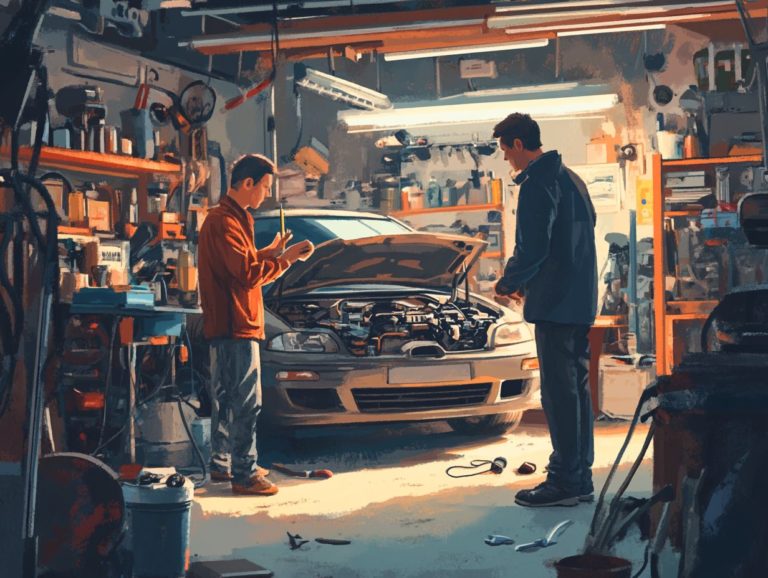How to Check for Accident History
When you re navigating the world of buying or selling a vehicle, knowing its accident history is a must if you want to make a smart purchase!
Accident history reports hold the key to vital information about a vehicle’s past. They empower you to make well-informed decisions. This guide will walk you through what an accident history report entails, why it matters for both buyers and sellers, and the various methods you can use to uncover this information.
You ll gain insights on how to interpret the details and spot potential red flags. You can also leverage this knowledge during negotiations. Whether you re hunting for a new vehicle or looking to part ways with your current one, mastering this knowledge is crucial to securing a fair deal.
Contents
- Key Takeaways:
- Understanding Accident History Reports
- Why Check for Accident History?
- Methods for Checking Accident History
- Interpreting Accident History Reports
- Red Flags to Look Out For
- Tips for Negotiating Based on Accident History
- Frequently Asked Questions
- 1. How do I check for accident history on a used car?
- 2. Can I check for accident history without a vehicle history report?
- 3. Is there a way to check for accident history for free?
- 4. What should I do if a vehicle history report shows accident history?
- 5. Can I check for accident history on a leased vehicle?
- 6. What if a vehicle has been in an accident but the damage was not reported?
Key Takeaways:
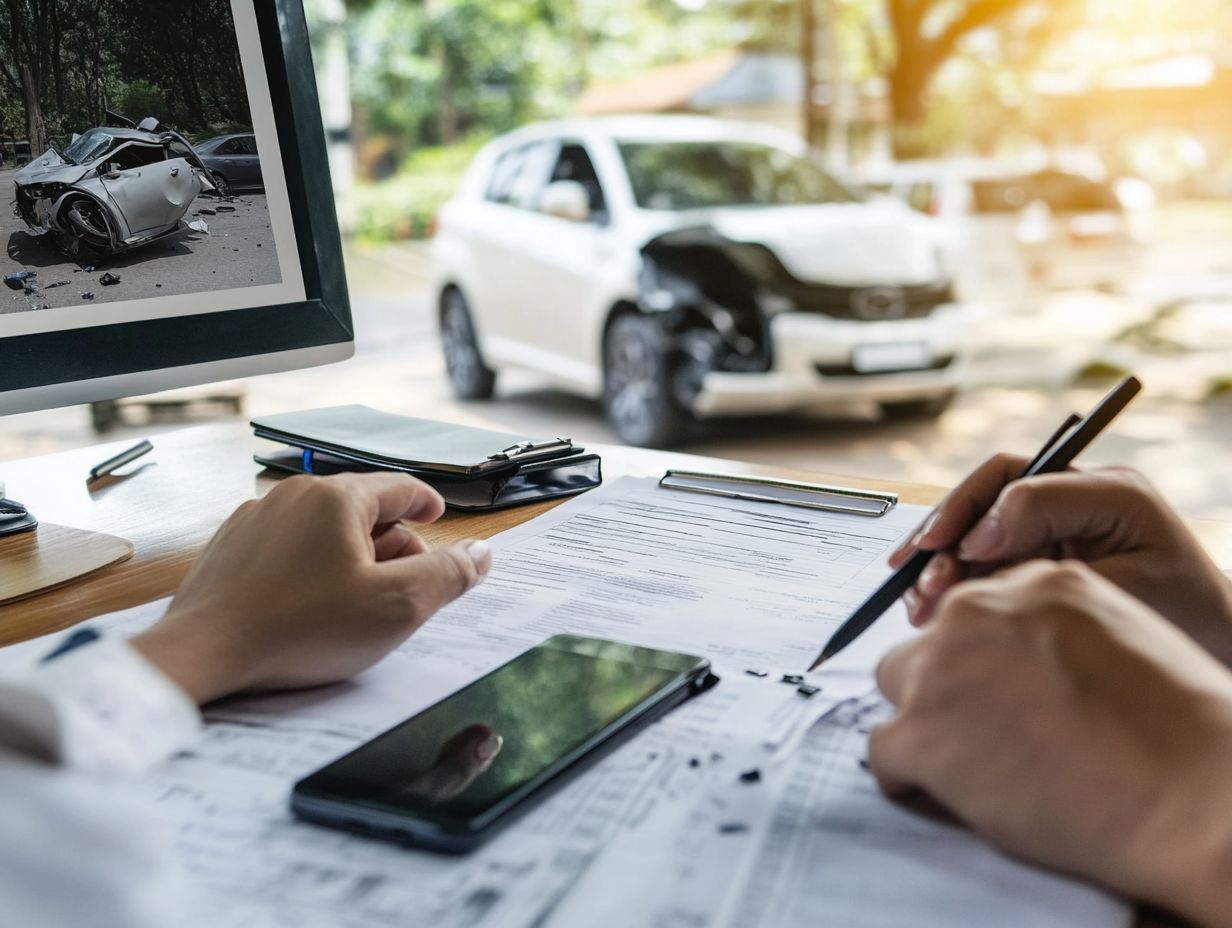
- Be informed about a vehicle’s accident history before purchasing or selling it.
- Accident history reports are important for both buyers and sellers to ensure transparency and avoid potential issues.
- There are various methods for checking accident history, including online databases, VIN checks, physical inspections, and professional services.
- Understand the terminology and codes used in accident history reports to accurately interpret the information.
- Be aware of common red flags that may indicate a problematic vehicle.
- Use the information from accident history reports to negotiate a fair price for the vehicle.
Understanding Accident History Reports
Accident History Reports are essential documents. They offer detailed information about a vehicle’s history, especially incidents impacting its strength and safety.
Knowing this helps you understand any accident records, warranty issues, and details about the car’s features that could affect the market value. Organizations like the National Highway Traffic Safety Administration and the Insurance Institute for Highway Safety are instrumental in gathering this crucial data in the interest of consumer protection.
What is an Accident History Report?
An Accident History Report is an essential document that details a vehicle’s involvement in accidents. It highlights critical information such as title records, lien records, and whether the vehicle has been salvaged.
This report is typically gathered from a variety of vehicle history databases and accident records maintained by reputable insurance companies, state agencies, and other trustworthy organizations.
As a potential buyer, understanding the accident history is crucial. It can significantly influence a vehicle’s current value and reliability.
Utilizing tools like Carfax and AutoCheck provides you with in-depth insights. This enables you to determine if a vehicle has undergone serious repairs or has been classified as salvage.
It’s particularly important to check for salvage titles. These often indicate extensive damage or costly repairs, which could lead to ongoing maintenance challenges or safety concerns in the future.
Why Check for Accident History?
Ensuring you check for an accident history is crucial for both buyers and sellers. It fosters transparency and safeguards consumer interests in the intricate realm of used car shopping.
By obtaining a comprehensive vehicle history report, you can more accurately evaluate the true condition and value of a vehicle. This diligence helps you steer clear of potential warranty issues and hidden damages that could result in expensive repairs later on.
Your peace of mind is just a report away! Don t risk your money! Check the accident history before sealing the deal.
Importance for Buyers and Sellers
Understanding the accident records in a vehicle history report enables you as a buyer to make informed purchasing decisions. This knowledge safeguards your investment and ensures you aren’t misled about the vehicle’s specifications. It enhances your confidence in the vehicle’s value and fosters trust in the entire transaction process.
If you re a seller who openly discloses your vehicle’s accident history, you can build stronger relationships with potential buyers. This paves the way for smoother sales. By providing comprehensive details about the vehicle, including any past incidents, you demonstrate a commitment to consumer protection, helping to alleviate any concerns about the vehicle s reliability.
Clear communication regarding accident history can elevate the perceived value of a well-maintained vehicle, creating a win-win situation for both parties in the used car shopping experience.
Methods for Checking Accident History
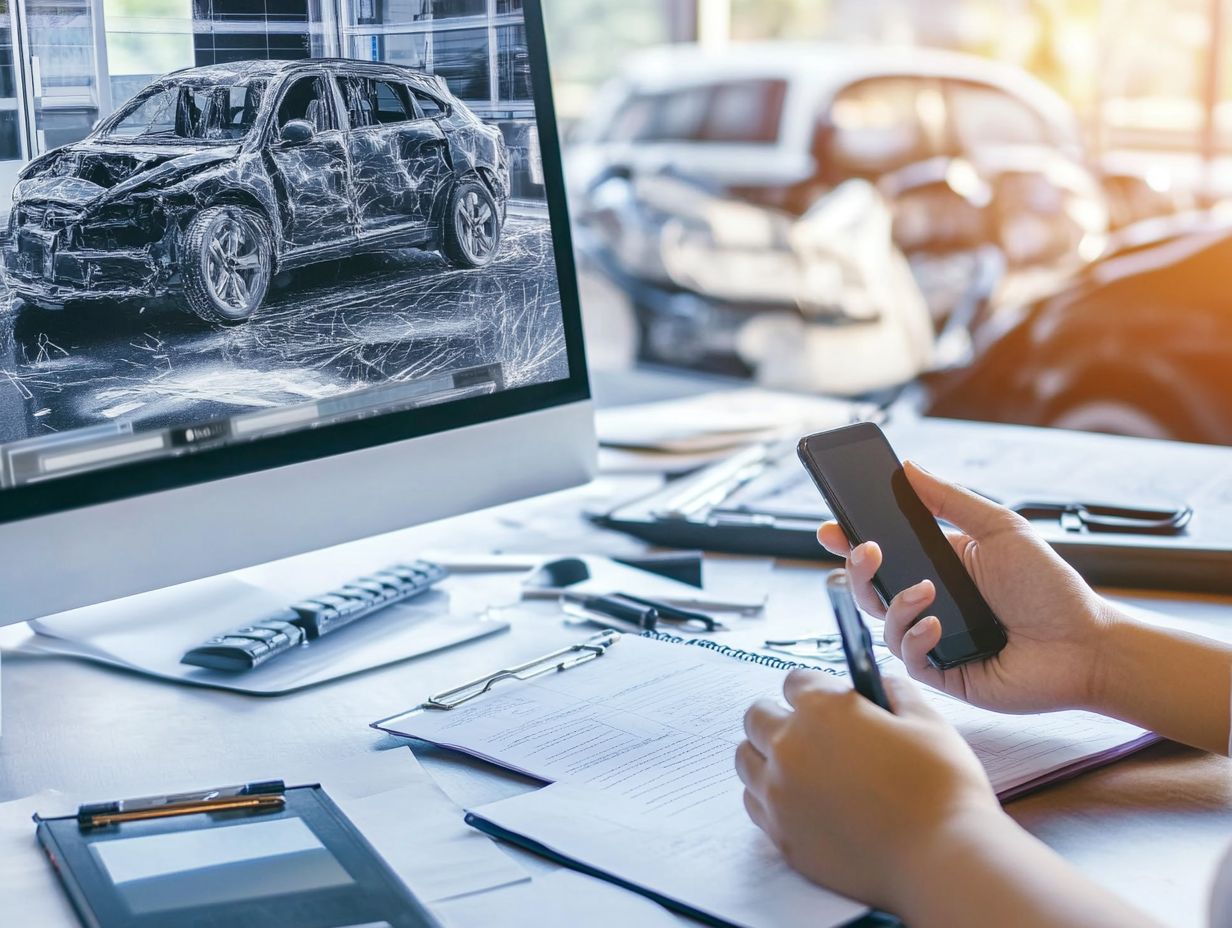
Discover several effective methods to check a vehicle’s accident history. Using a Vehicle Identification Number (VIN) check tool to access online databases can provide you with comprehensive vehicle history reports.
This approach enables you to verify the claims made by sellers and uncover any hidden issues that might not be obvious from a straightforward visual inspection.
Online Databases and VIN Checks
Online databases and VIN check tools are invaluable resources for you when seeking a comprehensive vehicle history report. They allow you to quickly verify VIN details against trusted vehicle history sources, including the NMVTIS website.
Using these tools enables you to make better-informed purchasing decisions, as they reveal critical information about a vehicle s past accidents, title issues, and previous ownership details included. Services like Carfax and AutoCheck are popular choices among consumers, offering detailed reports that many find trustworthy. It s essential to cross-reference information with multiple sources to ensure accuracy.
While NMVTIS serves as a primary resource for national vehicle information, checking local records and dealer listings can uncover additional insights. This reinforces the necessity of thorough due diligence in any vehicle transaction. Don t wait check the accident history before making your purchase!
Physical Inspection and Professional Services
Along with leveraging online tools, securing a physical inspection through professional services ensures that you receive a comprehensive evaluation of the vehicle’s condition. This process offers insights that online vehicle history reports might miss, especially concerning accident records.
A professional inspection digs deeper into the car’s mechanical, structural, and aesthetic facets, revealing hidden damage or wear and tear that an online report simply cannot showcase. Experts will assess the engine, brakes, suspension, and even the vehicle s alignment, identifying any potential issues early on. This thorough assessment shines a light on the current state of the vehicle and provides valuable information regarding future maintenance needs.
When you combine this detailed analysis with data from vehicle history reports, you empower yourself to make informed decisions and sidestep the pitfalls that arise from overlooking crucial details.
Interpreting Accident History Reports
Interpreting accident history reports can indeed feel overwhelming, particularly for those who aren’t well-acquainted with the specialized terminology found within these documents.
Terms like accident records, title brand checks, and signs of potential odometer rollback can be perplexing at first glance.
It’s crucial to familiarize yourself with these terms to navigate the reports effectively and enhance your understanding of the vehicle s history.
Understanding Terminology and Codes
Understanding the terminology and codes in an accident history report is essential for accurately deciphering the information. These terms highlight specific accident records and the severity of past incidents.
With this knowledge, you can assess a vehicle s safety and reliability based on its history on the road. For example, terms like “collision severity” or codes representing specific types of crashes offer valuable insights into how well a vehicle has endured accidents. Such assessments help identify the risks associated with a car that may have a troubled past.
Familiarizing yourself with common abbreviations, like “OMVIT” (official minimum vehicle integrity testing), is crucial. This knowledge reveals whether a vehicle has met the necessary safety standards after accidents. Being well-versed in these details is imperative for anyone navigating the used car market.
Red Flags to Look Out For
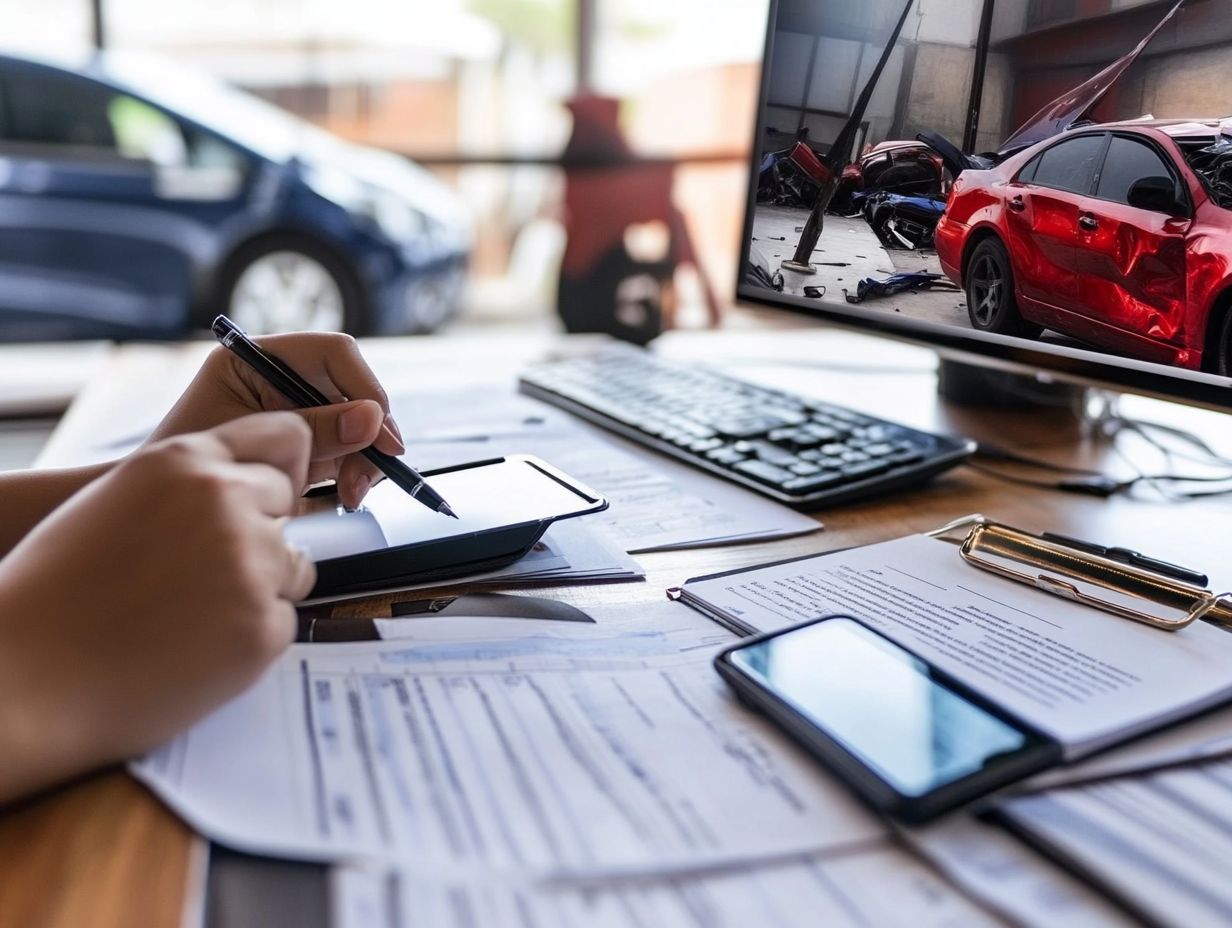
When you review an accident history report, several key red flags could signal a problematic vehicle. Keep an eye out for multiple accident records or discrepancies that might hint at underlying warranty issues.
Common Signs of a Problematic Vehicle
Common signs of a problematic vehicle often include multiple accident records, extensive repair histories, or a record of theft. These factors can significantly impact both the vehicle’s safety and its market value.
Such indicators should raise red flags for you as a potential buyer. They hint at deeper mechanical or structural issues that may surface later. For example, if a car has a history of major collisions (serious accidents causing significant damage), it may harbor hidden damage that undermines its overall integrity, leading to expensive repairs or serious safety concerns.
Vehicles that have undergone frequent repairs might signal a lack of reliability. This could make you think twice before committing to a purchase. Make sure to evaluate these past incidents alongside the vehicle’s current condition to safeguard both your wallet and your safety on the road.
Tips for Negotiating Based on Accident History
Negotiating with awareness of accident history can profoundly influence the final price of a vehicle. Informed buyers can skillfully leverage insights from accident records to make lower offers and secure a more advantageous deal while safeguarding their consumer rights.
Using the Information to Your Advantage
Leveraging information from accident history reports can be your secret weapon during negotiations, enabling you to discuss vehicle value and any potential red flags with confidence.
By presenting clear evidence of previous incidents, you not only reinforce your position but also demonstrate a commitment to consumer protection. This method informs you as a potential buyer and equips you to make decisions that truly reflect your interests.
Being well-versed in a vehicle’s history can significantly enhance your bargaining power. When you articulate concerns backed by factual data, it encourages sellers to reconsider their initial pricing, laying the groundwork for a more equitable negotiation. Knowledge is power use it to negotiate the best deal today!
Frequently Asked Questions
1. How do I check for accident history on a used car?
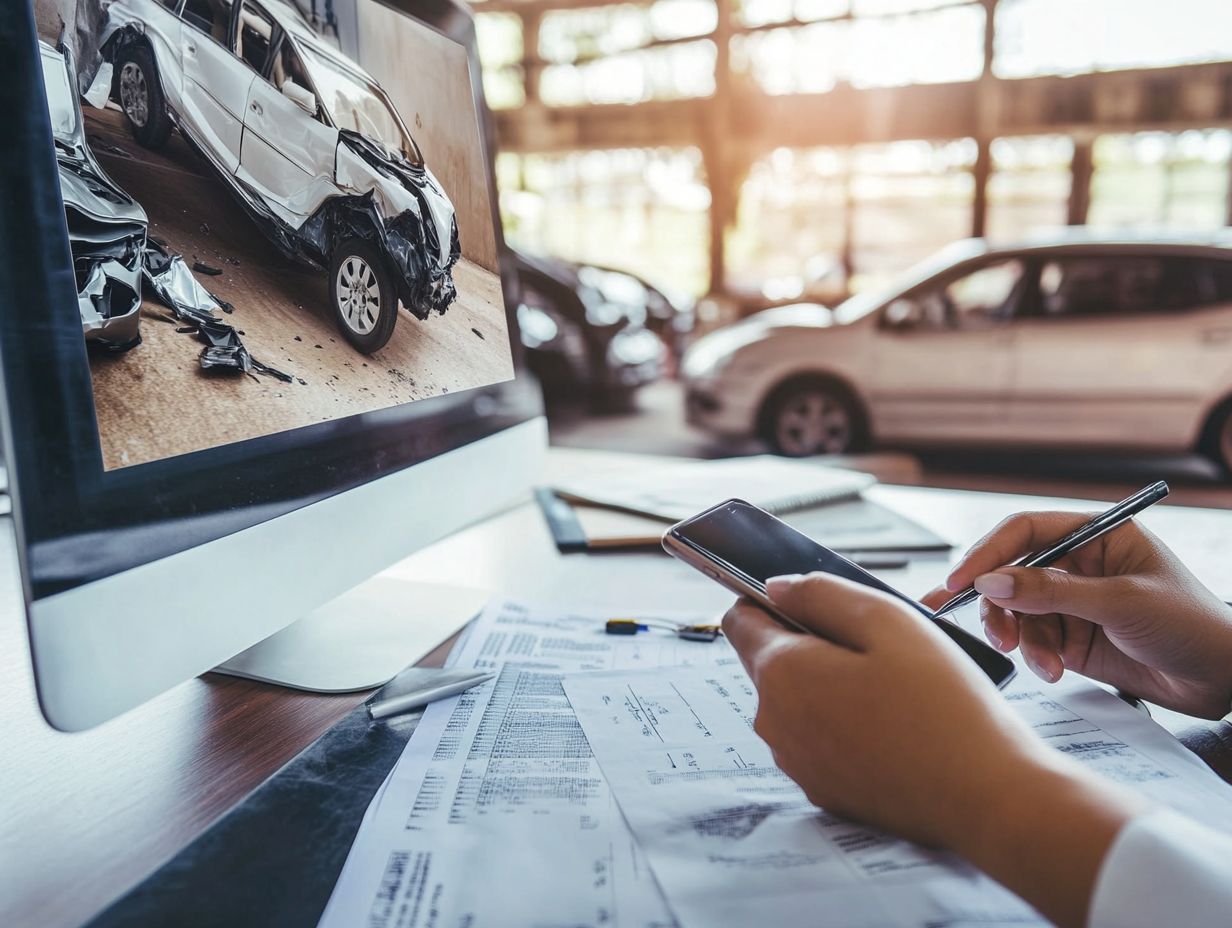
To check for accident history on a used car, request a vehicle history report from a reputable source, such as Carfax or AutoCheck. This report provides information on any reported accidents, as well as other important details about the vehicle’s past.
2. Can I check for accident history without a vehicle history report?
Yes, you can still check for accident history without a vehicle history report. Start by visually inspecting the car for any signs of damage or repairs, such as mismatched paint or new parts. You can also request the car’s maintenance records and speak to the previous owner for more information.
3. Is there a way to check for accident history for free?
Most vehicle history reports cost money. You can check for accident history for free through the National Motor Vehicle Title Information System (NMVTIS). This U.S. Department of Justice database provides a vehicle’s title history, including reported accidents.
4. What should I do if a vehicle history report shows accident history?
If a vehicle history report shows an accident, review the details closely. The accident’s severity may impact the car’s safety and value. You might want to get a professional inspection or negotiate a lower price before buying the car.
5. Can I check for accident history on a leased vehicle?
You can check accident history for a leased vehicle. If you re considering a lease takeover, request a vehicle history report to check for any accidents that could affect the car’s condition.
6. What if a vehicle has been in an accident but the damage was not reported?
If a vehicle has been in an accident but the damage wasn’t reported, it won’t appear on the history report. However, this doesn t mean the accident didn t happen or that repairs weren’t made. Always inspect the car thoroughly and talk to the previous owner before you buy to avoid surprises.
Check these reports today to protect your investment!




